2011 Inductees
Betty Q. Banker, MD
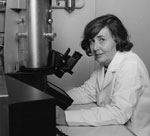
Betty Q. Banker, MD was a trailblazer her entire life. A renowned neuropatholgist, she is best known for her extensive work on muscular dystrophy.
Dr. Banker began her career at MetroHealth in 1962 as the Director of the Division of Neuropathology. Her writings are highly regarded, and much in them is still relevant.
She played a critical role in educating pathology and neurology residents, was a respected leader and served in multiple capacities at the Muscular Dystrophy Association, including Vice President. Dr. Banker was a Professor of Pathology at Case Western Reserve University School of Medicine.
Edward M. Chester, MD

Edward M. Chester, MD advocated on behalf of patients and taught students the importance of quality care in an outpatient setting.
In 1963, he was asked to develop an Ambulatory Medicine Teaching Clinic at MetroHealth. It gained national acclaim and flourished as students from around the country applied for internships. Though teaching and clinical work remained his passions, he also conducted significant research including diseases of the eye resulting from systemic disease, particularly diabetes and hypertension.
He served on several committees, was awarded the Kaiser Permanente Prize for Excellence in Teaching and appointed to Fellow of the American College of Physicians. Dr. Chester was Emeritus Professor of Medicine at Case Western Reserve University School of Medicine.
Brown M. Dobyns, MD, PhD
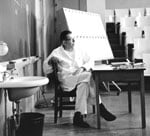
Brown M. Dobyns, MD, PhD A problem solver by nature, Brown M. Dobyns, MD, PhD, conducted research leading to the invention of the directional Geiger counter in the late 1940s, and revolutionized the way thyroid disease was diagnosed.
An internationally renowned thyroid surgeon, Dr. Dobyns began his career at MetroHealth in 1951 as Assistant Chief of Surgical Services and later became Associate Director of Surgery. For many years, he treated thyroid cancer victims in the Marshall Islands, utilizing his research to improve their lives.
He was President of the American Thyroid Association and was honored by a number of local and national organizations including the Cleveland Medical Hall of Fame. When he was in his 40s, he became a full professor at Case Western Reserve University School of Medicine.
Robert M. Eiben, MD
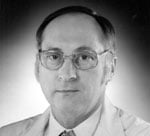
Robert M. Eiben, MD Driven by a passion for healing children, Robert M. Eiben, MD, began his career at MetroHealth in 1945. Assuming the role of Assistant Director of the Division of Contagious Diseases, shortly before the height of the polio epidemic, Dr. Eiben’s success with caring for and transitioning polio victims back to their home gained national recognition.
Dr. Eiben then turned his attention to the emerging field of pediatric neurology, conducting important research into the neurological and cognitive challenges of low birth weight infants.
As the Director of Child Neurology at MetroHealth,Dr. Eiben provided compassionate care to an untold number of young patients. His lifetime commitment to Case Western Reserve University School of Medicine was recognized when he was awarded Emeriti Faculty Marshal for the school from 1992-2007.
Richard B. Fratianne, MD
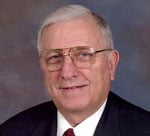
Richard B. Fratianne, MD, founder of MetroHealth’s nationally recognized Comprehensive Burn Care Center in 1970, pioneered not only a medical approach to trauma treatment but also the need for holistic care.
He also founded MetroHealth’s Level 1 Trauma Center and was the first Medical Director for Metro Life Flight. He is a recipient of the Albert Schweitzer Memorial Trophy and The Richard B. Fratianne, MD, Professorship in Surgery at MetroHealth, established at Case Western Reserve University School of Medicine in his honor.
John W. Harris, MD

John W. Harris, MD, gained national acclaim early when he cracked the code of sickle cell anemia, a catalyst to diagnosis and treatment of the disease. In 1952, Dr. Harris became the Director of the Division of Hematology at MetroHealth.
He advanced the hospital’s academic program and created a landmark new approach for teaching hematology. A prolific researcher and writer, Dr. Harris was a Professor of Medicine at Case Western Reserve University School of Medicine and an active member of numerous national and international organizations.
He was President of the American Society of Hematology, held fellow positions with the International Society of Hematology and the American College of Physicians, and was inducted into the Cleveland Medical Hall of Fame.
Howard Karsner, MD
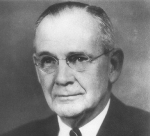
Howard Karsner, MD, greatly advanced American pathology when he introduced it into the Harvard Medical School curriculum in 1911. He was the energy behind the construction of the Institute of Pathology at Case Western Reserve University School of Medicine and was Chair of the Department of Pathology.
In the 1920s, he became MetroHealth’s Divisional Chief of Laboratories and Department Head of Pathology. With research and education as top priorities, Dr. Karsner facilitated the construction of a diagnostic laboratory at MetroHealth.
In addition to his numerous breakthrough publications and long-term service to national organizations, Dr. Karsner received the prestigious “gold- headed cane” award from the American Association of Pathologists.
Irving Kushner, MD
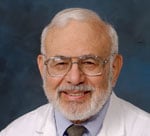
Irving Kushner, MD An authority on inflammatory diseases, Irving Kushner, MD, is internationally renowned for his research on C-reactive protein as an indicator of arthritis.
Beginning in 1958, and spanning more than 50 years, Dr. Kushner held numerous leadership positions within MetroHealth and outside, including the Director of the Division of Rheumatology and Medical Director of Highland View Hospital where he oversaw the transition of the hospital to a rehabilitation center on the MetroHealth main campus.
He is a Professor Emeritus of Medicine at Case Western Reserve University School of Medicine and has been recognized as a Master of the American College of Rheumatology, one of the highest honors the college bestows.
Henry Manning

Henry Manning An innovative president and CEO, Henry Manning came to MetroHealth in 1970, and over the next two decades built MetroHealth into one of the most highly rated public institutions in the United States.
He oversaw the establishment of the Neonatal Intensive Care Unit, Metro Life Flight, John A. Gannon Center for Burns and Trauma, and the Rammelkamp Center for Education and Research.
Other major accomplishments included the construction of the inpatient Towers, transfer of Highland View Hospital to the MetroHealth campus, and the uniting of multiple facilities, programs and services to form The MetroHealth System.
His vision as a leader was sought by many organizations, and he served as the Chairman of the Board of Trustees of the Ohio Hospital Association.
Edward G. Mansour, MD
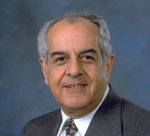
Edward G. Mansour, MD, joined the surgical faculty at MetroHealth in 1969, and during his 46-year career made an indelible mark on the institution.
He was the Director of the Division of Surgical Oncology for 30 years, and under his leadership MetroHealth opened the region’s first multimodal oncology clinic.
Dr. Mansour received international recognition for a long-term study that led to key changes in the medical management of breast cancer patients. Dr. Mansour is Professor of Surgery at Case Western Reserve University School of Medicine.
Jerome R. Pomeranz, MD
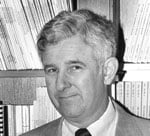
Jerome R. Pomeranz, MD, joined MetroHealth in 1965 as the Director of Dermatology and eventually built it into a full-fledged department. His influence in dermatology and dermatopathology was transformative for MetroHealth and Greater Cleveland.
Dr. Pomeranz conducted pioneering research in the immunology of contact dermatitis, played a leading role in the growth of local and national dermatological societies, and was a dedicated academician. The highly competitive residency program that he built continues to attract applicants nationally.
Dr. Pomeranz served on the Dermatology Advisory Committee for the Food and Drug Administration (FDA) for nearly 20 years, and was Associate Professor of Dermatology and Pathology at Case Western Reserve University School of Medicine.
Louis Rakita, MD
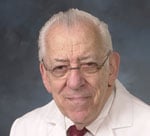
Louis Rakita, MD, joined MetroHealth in 1952 and became the first Chief of Cardiology. A gifted teacher, he pioneered methods of diagnosing and treating electrical activity of the heart. He established the hospital’s first Cardiology Care Unit, which quickly became a nationally recognized leader.
An active member of many local and national organizations, Dr. Rakita served the American Heart Association in several capacities and received their highest honor, the Award of Merit and Gold Heart Award.
Dr. Rakita was Professor Emeritus of Clinical Medicine at Case Western Reserve University School of Medicine. The Rakita-Moss Professorship in Cardiology at Case Western Reserve University School of Medicine was established in his honor.
Charles H. Rammelkamp Jr., MD
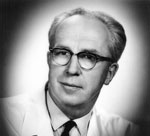
Charles H. Rammelkamp Jr., MD, conducted research that led to the treatment of strep throat and prevention of rheumatic heart disease, as well as research establishing the basis of the clinical use of penicillin.
In 1950, he came to MetroHealth to become the Director of Research and the first Academic Chair. He developed a nationally recognized teaching program for undergraduate medical students that combined research and patient care.
Dr. Rammelkamp’s career was distinguished by numerous offices and awards including Vice President of the American Epidemiology Society, Governor and Regent of the American College of Physicians, the Albert Lasker Group Award and the American Heart Association’s first Research Achievement Award.
Dr. Rammelkamp was Professor of Medicine and Preventive Medicine at Case Western Reserve University School of Medicine.
Frederick C. Robbins, MD
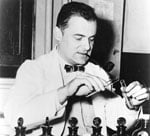
Frederick C. Robbins, MD, was the Director of Pediatrics and Contagious Diseases at MetroHealth. He shared the Nobel Prize in Physiology or Medicine in 1954 with Drs. John F. Enders and Thomas H. Weller, for their landmark research on the polio virus, leading to the development of the first polio vaccine.
Dr. Robbins also originated the idea of a Child Life Program, an enrichment program for hospitalized children that has become standard in all hospitals.
He was Professor of Pediatrics, and later, Dean of the Case Western Reserve University School of Medicine and served many national and international organizations, including as chair of the Pan American Health Organization commission that oversaw the eradication of polio in the Western Hemisphere.
Roy W. Scott, MD

Roy W. Scott, MD, was a noted heart expert and charismatic leader. Appointed Director of MetroHealth’s Department of Medicine in 1929, he was an authority on heart disease, and traveled throughout Ohio and nearby states as a consultant.
He gained national and international renown as a researcher, writer, speaker and teacher, and served as an examiner for the American Board of Internal Medicine. Dr. Scott belonged to numerous professional societies and was the first Clevelander to assume the presidency of the American Heart Association.
As he was dying from an aortic aneurysm, Dr. Scott apparently used his last hours to instruct his attending physicians.
Fiorindo Simeone, MD
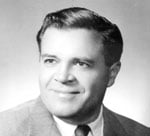
Fiorindo Simeone, MD Driven by his experiences in World War II, Fiorindo Simeone, MD, unearthed the true nature of shock and its role in determining life or death following trauma.
As MetroHealth’s first full-time surgeon in 1950, he helped design the hospital’s first emergency room, a precursor to today’s trauma center, and one of the first of its kind in the country.
In his role of Professor of Surgery at Case Western Reserve University School of Medicine, he helped shape the curriculum and clinical experience for medical students. Considered one of the finest academic surgeons of his time, he was frequently called upon to assist with the initiation of surgical, research and teaching programs nationally and internationally.
Robert M. Stecher, MD
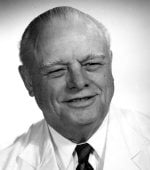
Robert M. Stecher, MD, an acclaimed international authority on arthritis and rheumatic diseases, chose his area of medicine when his mother became afflicted with rheumatoid arthritis. Joining MetroHealth in 1926, he played a key role in developing the rheumatology division at the hospital, the Brittingham Memorial Library and The MetroHealth Foundation. Dr. Stecher was an energetic mentor, prolific writer and involved civic leader.
His leadership roles included President of The MetroHealth Foundation, American Rheumatism Association and International Society of Rheumatism.
A founder of the Cleveland Health Museum, he was also an engaged promoter of the Cleveland Zoological Society and Cleveland Museum of Natural History.
When Case Western Reserve University School of Medicine promoted him to Clinical Professor he was one of only two holding that rank at the time.
Maurice Victor, MD

Maurice Victor, MD, an internationally renowned neurologist and expert in the area of nerve disorders, conducted pioneering research linking malnutrition and alcoholism. In 1962, he joined MetroHealth as Director of Neurology and later was President of the Medical Staff.
He received the Raleigh Hills Foundation International Gold Medal Award for Excellence in Alcoholism Research. Dr. Victor was Professor of Neurology at Case Western Reserve University School of Medicine, wrote texts that are still classics, served on numerous national and international committees, and was President of the Association of University Professors of Neurology.
Robert J. White, MD, PhD

Robert J. White, MD, PhD During the four inspirational decades that Robert J. White, MD, PhD, dedicated to MetroHealth, he gained an international reputation for revolutionary, life-saving techniques in brain surgery and advancing knowledge of the central nervous system.
Soon after his arrival at MetroHealth in 1961, he became the youngest full professor at Case Western Reserve University School of Medicine. He was MetroHealth’s first Chief of Neurosurgery and established a brain research lab, the site of numerous firsts in medical history. Dr. White wrote over 900 publications on clinical neurosurgery, medical ethics and health care.
His numerous awards include The Distinguished Membership Award of the Cleveland Academy of Medicine, the Humanitarian Award of the American Association of Neurological Surgeons and the Distinguished Alumni of the Mayo Foundation.
Emanuel Wolinsky, MD
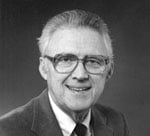
Emanuel Wolinsky, MD, developed pulmonary tuberculosis in 1941, when he was graduating medical school. During treatment at the Trudeau Sanatorium in Saranac Lake, New York, he and his mentor Dr. William Steenken conducted groundbreaking research resulting in an effective anti-tuberculosis drug therapy.
Dr Wolinsky joined MetroHealth in 1956 and became Chief of the Division of Infectious Diseases and Professor of Medicine and Pathology at Case Western Reserve University School of Medicine.
Researching aspects of non-tuberculosis mycobacteria, he became a world expert, and the International Working Group on Mycobacterial Taxonomy designated Mycobacterium wolinskyi in his honor.
Among his many awards were the American Thoracic Society’s Trudeau Medal and the Louis Weinstein Award for the best clinical article, later renamed the Emanuel Wolinsky Award.